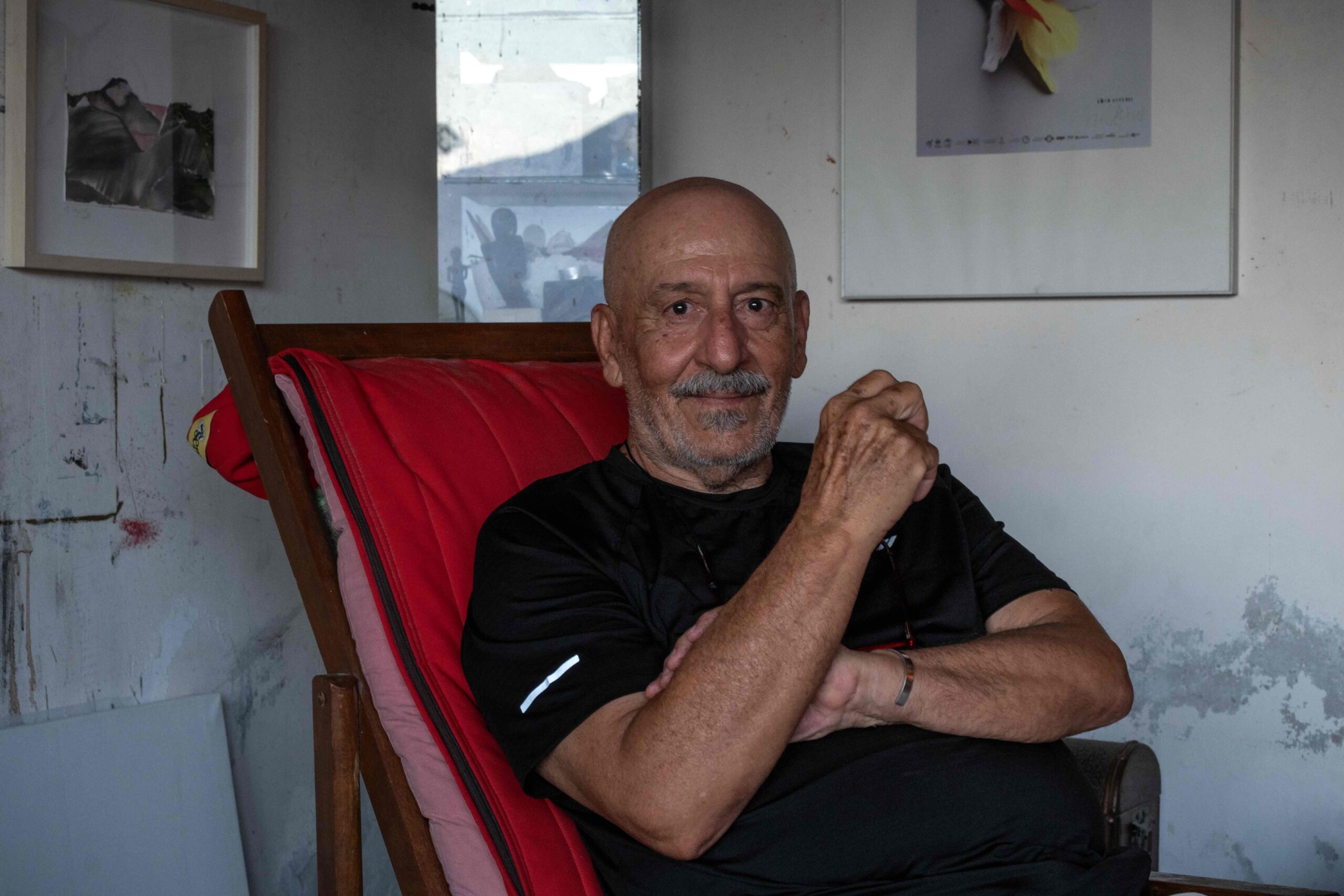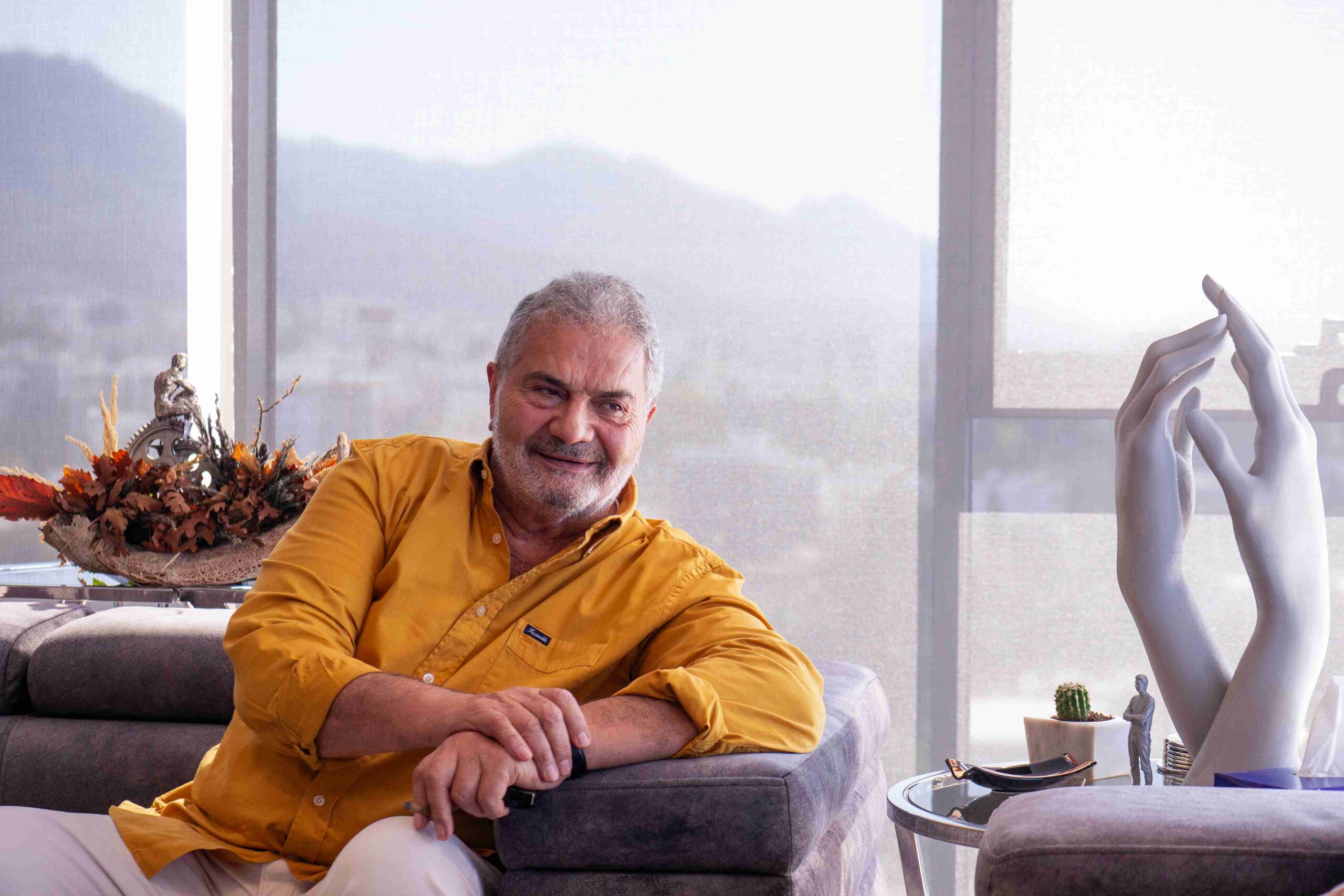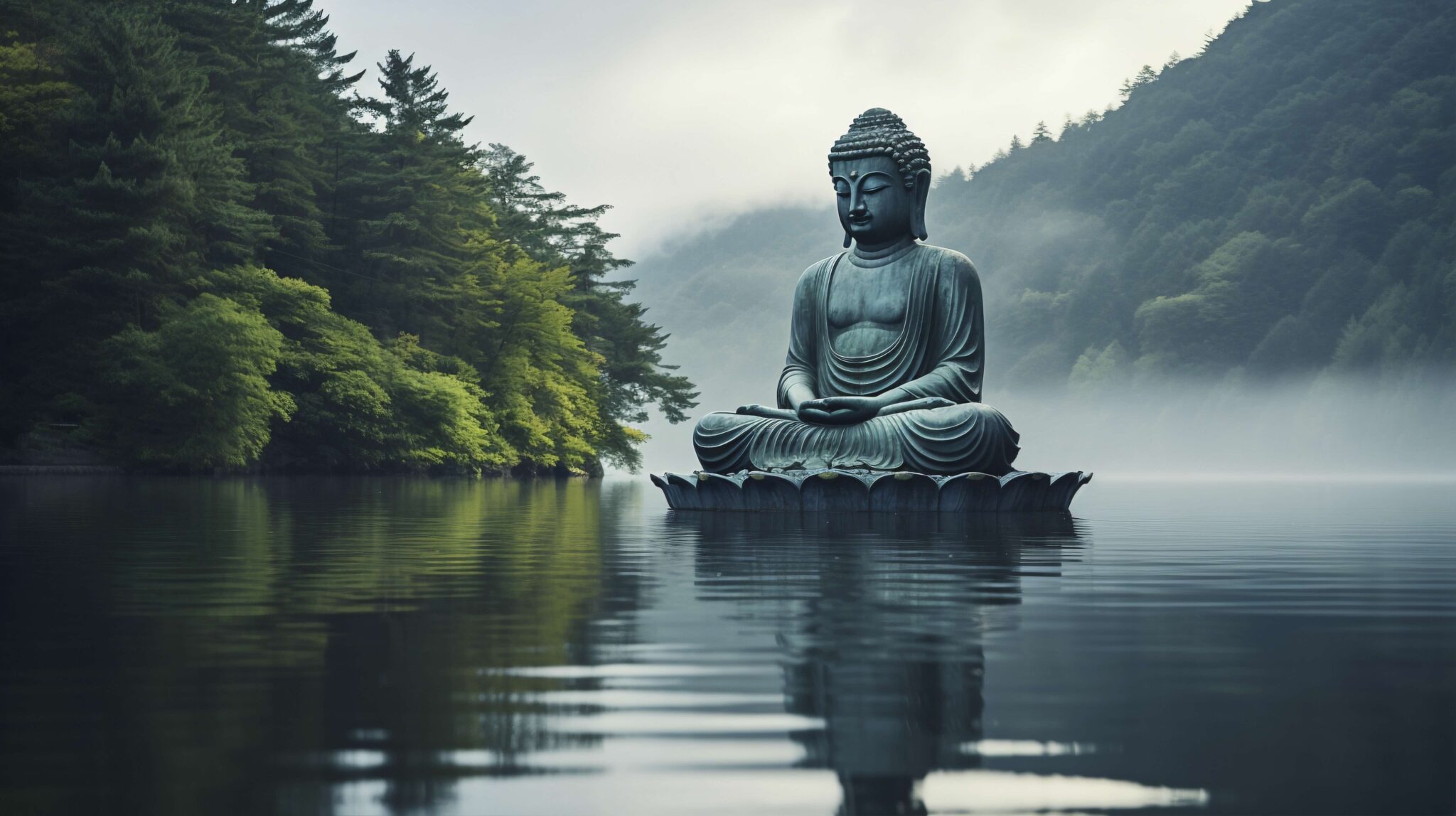Emin Çizenel, born in 1949 and educated at the Istanbul Academy of Fine Arts, occupies an exceptionally unique place with his life story, artistic practice, and character. With his distinctive stance and language, he is an artist with universal significance, something that the Turkish art scene has yet to fully acknowledge. Although we are introducing Çizenel a bit late in these pages, we met him at his studio in Kyrenia. Cypriot artist Emin Çizenel is a witness who traces his lived experiences not only on canvas but also in words. In our conversation, spanning from war and migration to rehabilitation camps and Greek houses, we witness how an artist intertwines his personal memory with the fragile history of his country. Çizenel, while making visible the suppressed memory of Turkish Cypriot identity, its unique language, cultural color, and sensitivity, reminds us that art is a form of expression, healing, and resistance. Çizenel’s narrative, “I painted what I lived,” is not just an individual but a collective story turned into art. We discussed that story with Emin Çizenel.
Mr. Emin, here is the matter: I think we are quite late in understanding the unique cultural texture and importance of Cyprus, so I wanted to address this topic as much as I can with a writer’s responsibility. I believe there is much to learn from you.
Please, no need for such compliments. But I do appreciate this intention. You see, this island is no longer a remote island. It is not far from Turkey or the world. On the contrary, it is a boiling island right in the middle of the Mediterranean. Art has been created and discussed on this island for years. There is an exchange with Istanbul and other countries.
My father was a sailor. I remember we came to Cyprus at least twice when I was a child. I know that he liked this place and valued it culturally. He was an avid reader; his circle was surrounded by intellectual writers and artists. His interest in Cyprus has always intrigued me. I remember visiting the Barbarism Museum when I was young. Anyway, over the years, I’m not sure what happened, but for a long time, we forgot about Cyprus. When I came here a few months ago, I found a small but high-quality contemporary art world and a university dedicated to culture and art. However, as soon as I landed at the airport, billboards for casinos and posters of boring celebrity figures with concerts were everywhere. In Turkey, whenever Cyprus is mentioned, it is associated with mafia rule. This is not Cyprus; it is definitely not what I knew. The Cyprus that my father loved was certainly not like this.
The soldiers of that time were very much involved with art. I saw this when I was a student at the academy. You know, in the tradition of Turkish painting, military painters have an important place.
There is something unique on this island, something that belongs to it. How do we solve this? Should I call you Cypriot Turks?
Well, to put it simply, the Turkish people living here and the people of Turkey seem like two different colors. This must be acknowledged first. The Turks living on this tiny island exist with their islander characteristics, influenced by the layers of different cultures, with their ways of behavior, sense of humor, and food culture… With a life culture that is more aligned with the West, shaped by the British colonial era, a Turkish Cypriot society. A dialect influenced by other languages, but expressed with many authentic Turkish words. We use a Turkish language with old Turkish roots, with different stresses. If you listen closely to the conversations here, you will hear very old pure Turkish words. Even when French or English words entered Turkish in Turkey, we used pure Turkish words instead, even when we were under British colonial rule.
Can you give an example?
You say “viraj” (curve), right?
Yes. What do you say?
Do you know what we call it? Büküm. Completely pure Turkish. You say “balloon”. Do you know what we call it? Şişirgen (blown up). You say “pedal” for a bicycle, right? We call it ayakça (footpiece). Yes. You say “steering wheel.” We call it dümen (rudder).
And there are thousands of such words. We grew up with these.
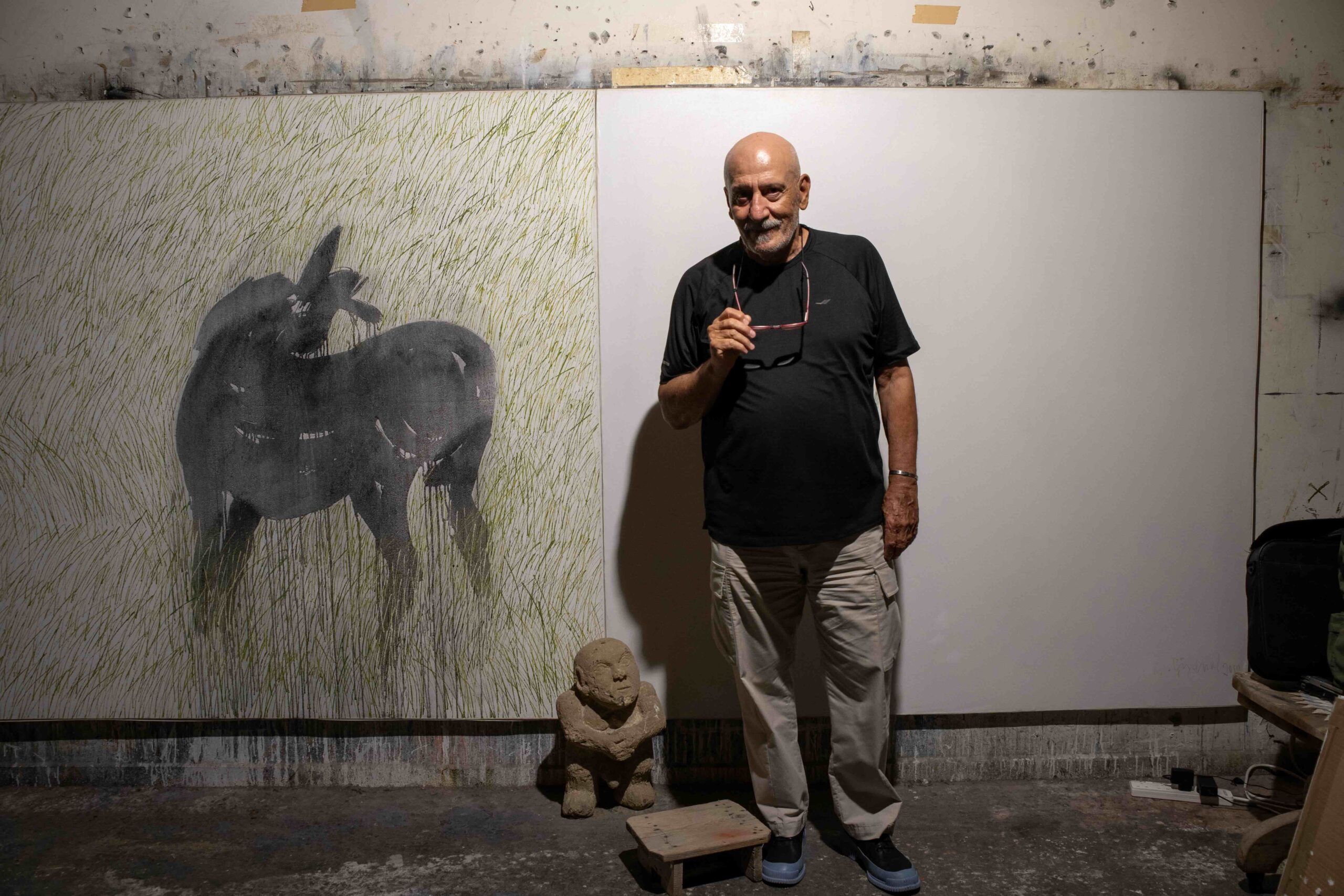
So, why this pure Turkish? Was it to protect ourselves from the British colonization?
Of course, it’s a deep psychology. To preserve it. My grandfather was an elementary school teacher. Before I started school, I went with them to the village where my grandfather was assigned. He was going to teach me the multiplication table so that my math foundation would be strong. In that little village, we started the day with the “Long Live Our Queen” march. “Long Live Our Queen” but in Turkish. Milk was distributed in bowls. We used to raise a heavy English flag, but after the first lesson, my grandfather would gently lower it. We’d raise the Turkish flag instead. I lived those days.
I really want to learn about these, I’m very curious…
During the British period, guns were banned, even pocket knives were forbidden. It was prohibited to bite trees, plants, or goats in the mountains. And what a prohibition it was! There were penalties. There were village guards who looked after these. This was the regulated life I’m talking about. The people on this island, the “inhabitants,” lived together like this. There was a governor above, the British governor. There were also high-ranking Turkish bureaucrats. I knew such people. Even 10 years ago, there were English Turks here.
English Turks?
They wore white suits, thick hats. Pocket watches, vests. Ladies, ladies with hats. These were Turks. Turkish high-ranking officials who spoke English. These were high-ranking bureaucrats of the British administration. I also had the chance to meet the last remaining members of this small minority. I once attended their parties. At architect Ahmet Bahattin’s house. There was a society like that. Turks living like the English, at the level of lords. I saw them too. This island, with its many different colors, is a very colorful mosaic.
I’m not sure if Turkey understands this or if we know it.
We’ve never been able to explain this. We’ve never been understood. The fact that this small community is a Turkish community with another color and a unique island character is still not understood. Despite the dominant cultural influences, we insist on preserving its essence…
Actually, Cyprus’ colors are a treasure, a value for Turkey. I agree with you. It needs to be protected. The Turkish Cypriot people’s existence in the Eastern Mediterranean should be preserved in its most authentic form.
These people shouldn’t be looked down upon so much. To humiliate an islander is the most painful thing. I had a very close friend from Turkey, a collector. He had many paintings in his collection. He used to say, “We will fry eggs on your neck.” This is how the small country syndrome is reflected to them. Therefore, it must be known: Here, a Turkish community with a Cypriot identity, shaped by the Mediterranean and open to the world, has preserved its identity despite all the influences. It has done so with a Kemalist, Republican, and democratic mindset. We have always celebrated the special days crowned by the Republic of Turkey with great enthusiasm. I even posted a photo on social media the other day from 1958. It was from the 23rd of April celebrations in my birth village, Malya. The year was 1858. Unbelievable.
Really?
In a Cypriot village in 1958, celebrating April 23rd in an elementary school. All the national holidays of the Republic of Turkey. What celebrations! Now, this society… “We saved you,” they say; even questioning our Turkishness. This is what hurts the most, what breaks us. The statement is: “If you’re not like us, go to the Greek side. If you don’t like it, leave. We are the natives here.” Well? Okay, then what does all our struggle mean? Nothing. From now on, this place is ours. Fine. That’s fine too. We can stay here, if you allow us. This society thinks, creates art… Despite the ongoing ceasefire in school books, they have eliminated the chauvinistic elements and published new textbooks that align with more peaceful, universal values. Through the Ministry of Education. I also tell this to the Greeks. To achieve a common solution on this island, we worked together in Greek/Turkish joint committees. Two years ago, we restored and returned 270 works of art by their most important artists to the Greeks. I am talking about such a society. Therefore, my anger is somewhat because of that.
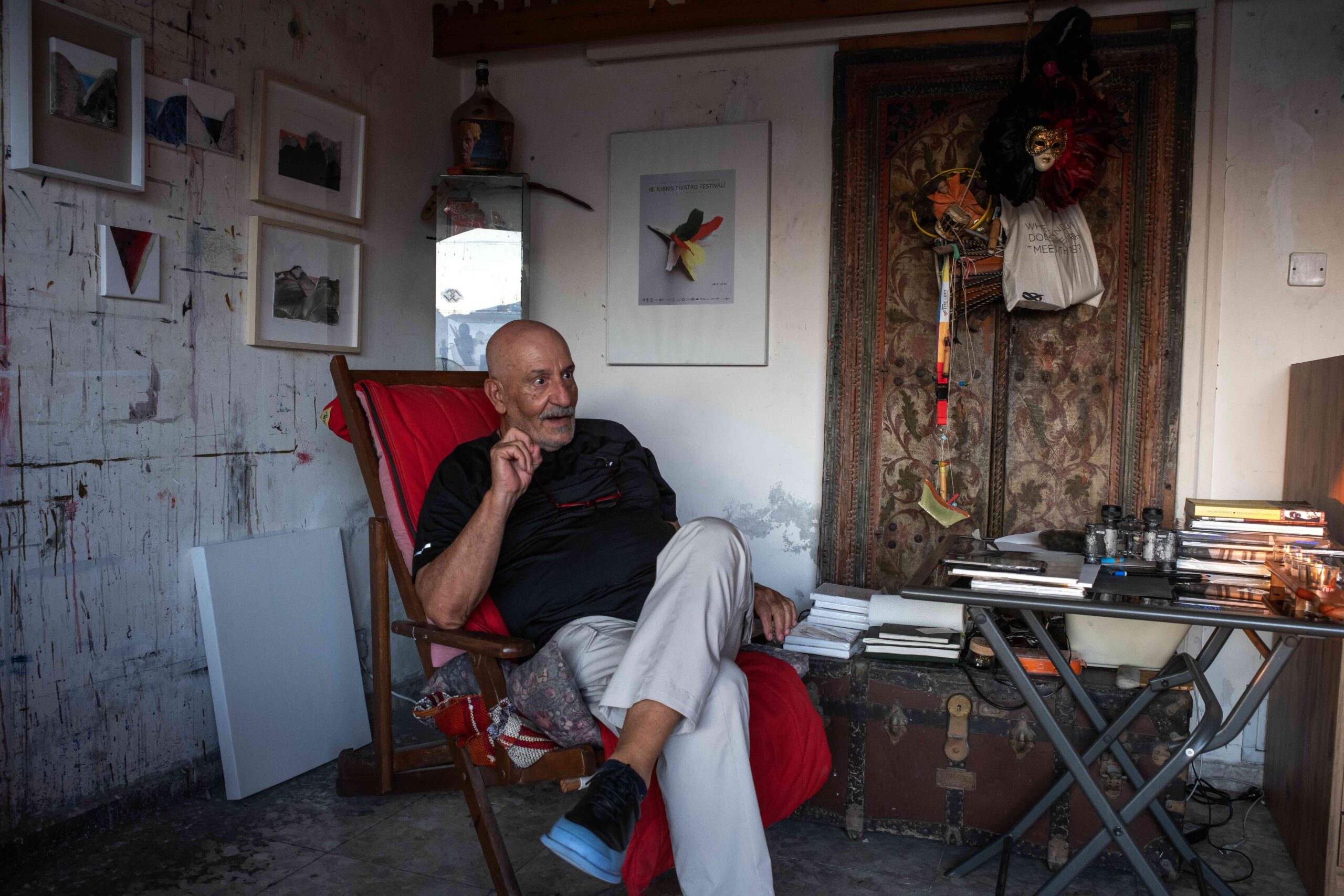
My feeling is that it’s a shame for Cyprus.
What did I do for a TV that came from France? They came from Paris. My friend and I, with our limited resources, restored a Byzantine-origin church. After the war, it was in a ruined state, thrown with trash. The ceiling had collapsed, and the frescoes on the walls were completely black. We worked for a year, with expertise from Italy, to restore it. These works are the common heritage of humanity. We see all the conditions that made this place our homeland as our own concerns.
Was it in Kyrenia?
Yes, on the east of Kyrenia. In Ozanköy. I showed this to the French TV, but they wanted me to tell the Cyprus story they had in mind. They wanted to impose their one-sided political perspective. And in the end, I lost my temper. But how I lost my temper! Are you going to interview me as an artist, or are you trying to get me to narrate the script you have in your head? Like a monkey in a cage. They said, “We’ll talk about your art too.” But the actual goal was to get me to read the pre-written script. I said, “No, I’m not doing the interview with you, I refuse.” They left.
The issue is: It seems everyone has a Cyprus story in their head…
A story likened to the monkey in the cage. This is a rehearsed, long-standing stereotype. We no longer want to be looked at like that. Being a Turkish Cypriot, living with a sense of guilt?! To live the tragic fate as a lifelong stereotype? Therefore, this society is now a part of the globalized world’s identity. And an important part. Because we are one of the most authentic pieces at the core of everyone’s view of Cyprus. We are in places where we produce thoughts, resist, and create art as part of the history of the geography.
You said it beautifully, but the perception created about Cyprus seems like an injustice to me.
Such injustices occur, many societies in the world face them. We do too. Even Turkey, the great country. So, we need to understand this correctly and react accordingly. It’s also a matter of how much we can explain ourselves. And there is also a strange deafness. We always have to explain ourselves to others. And that’s very exhausting.
Very exhausting.
And how. I now try not to say I’m from Cyprus in Istanbul. What does that mean? How sad is that? What a terrible situation psychologically. When I was a student in Istanbul, we proudly said we were from Cyprus. People liked it very much. Now, even a taxi driver gets angry. We are covered with prejudices we’ve inherited from hearsay.
Why does he say that?
“We saved you. You don’t like Turks.” That’s the sentence. Of course, not everyone thinks this way. I have met beautiful people and many friends since my student years. But some politicians didn’t hesitate to insult this society. They still continue. Unspoken words were said… This society doesn’t deserve such insults. Turkey’s presence here depends on these people. I tell you this. I believe Turkish Cypriots will open Turkey’s path to the European Union.
Now, speaking of Turkey, I will ask you about an important period of your life. You were at the Academy. Istanbul Academy of Fine Arts…
The academy is Turkey’s bright face. I’ve seen many academies in different countries around the world. I have never seen an academy like that.
I’m very curious about that period.
It was an academy where different art disciplines intertwined, shared, and inspired each other. It was magnificent.
Who was there? Let’s remember.
Zeki Faik İzer, Ali Avni Çelebi, Özdemir Altan, Bedri Rahmi Eyüboğlu, Dinçer Erimez, Devrim Erbil, Adnan Çoker, Nurullah Berk, Sabri Berkel, Neşet Günal, Şadi Çalık, Zühtü Müridoğlu, Sadi Diren, and many other invaluable people. They are the most important artists in Turkish art. I’m not discussing their art, but their teaching and charisma, the light they spread, the values that established the 200-year-old tradition of the Academy; the Sanayi-i Nefise School… You know, we used to work with nude models – the pleasure of creating art in a civilized environment was something else. It was magnificent to do this in a marble palace by the Bosphorus, with the waves crashing. The academy isn’t like that anymore. Back then, even the cafeteria was like a school. I remember, you could watch and listen to all the most intellectual conversations of Istanbul’s writers, artists, poets, the literary world in the academy’s cafeteria, and that was a wonderful privilege. We would open our antennas carefully not to miss a single word from them. That was another school. There were poetry matinees. The academy balls were legendary. Very creative costume balls. Fantastic costumes. I’m trying to describe the mindset of Istanbul at that time. A city with such a school, with the broadest tolerance, a civilized, cultured Istanbul. The models in the academy even went on strike because of low wages. Very democratic and respectful of human rights.
I can’t even imagine now…
Not just the academy, but Turkey as a whole has undergone change. When we went to Beyoğlu, we would dress in our best clothes. Because there were very well-dressed women, gentlemen, theaters, cinemas, pastry shops, and bookstores there. Istiklal Avenue was like the most beautiful streets in Paris. Maybe even more colorful than them. The cafes where the non-Muslims hung out… I would be amazed. How civilized these people were. No one would shout at anyone, no one would speak in a harsh, high tone. No one pushed or shoved anyone. I saw an Istanbul like this.
These are sad changes…
Alongside such decay in Istanbul, there are extremely well-educated young people, for example. They read, know the world, speak languages. In the past, there were very few people in Istanbul who spoke foreign languages. Only those who studied at foreign language schools. Now, there are young people who speak many languages, read a lot, travel a lot, and observe a lot. They have also established collaborations – for example, there are different art groups. There is certainly a deformation, a degeneration in form, but such processes happen and are temporary. Turkey will recover from somewhere new. It will start again. I tell you, this geography has always been full of pains and it will continue to be. Suddenly, we wake up with a new agenda. There is such a problematic, hot, and fast-moving agenda… In Cyprus, I’ve reached this age, but we could never relax. Is this really fair? We became immigrants twice, Şebnem. Do you know what it means to be an immigrant twice?
I can’t even imagine how hard that must have been.
To start life over twice and not even know where to start. It’s like the feeling of belonging disappears. You lose track of where you belong. And on the other hand, they call it crazy liberation. You do indeed become free. But without being able to gather many pieces. The destruction is immense.
But just as painful?
Don’t even ask, it’s a horrible situation. Do you know how this starts?
How?
First, you don’t understand anything. You’re trying to save your life. You forget everything left behind. Material things, properties go out of the picture; you’re only trying to save your life. In the beginning… And you go. With a bundle or with nothing. And you can’t even think about what you’ve left behind.
What happens after you’ve saved your life?
Then, when you start thinking, it hurts a lot. It’s agony. It’s a deadly situation.
Where did you leave when you migrated for the first time?
The place I left was a vineyard region that created an amazing lifestyle through its products. Malya. The southern peaks of the Troodos Mountains. Vineyards like Tuscany.
How old were you?
I was 17. We resisted for four days in that village against a regular, fully equipped Greek-Yunan army. For the first time against a regular army. The year was 1964. The Greeks wanted to start the Cyprus problem from 1974. In 1963 and 1964, serious problems started to arise on the island. I asked the Greeks about this at a meeting: “Do you know about this?” I asked. About the attacks in 1964. They didn’t! It was a tragicomical situation. Do you laugh or cry?
What was the role of the British soldier there?
At that time, there was no UN Peacekeeping Force. A group of British soldiers were performing a UN mission. They prevented a big massacre in the village.
The product you mentioned?
Grapes and of course, wine. Yes, it creates a lifestyle; you bury your nails into the soil. It’s a very tedious job. It’s something amazing, this product enters your life and chemistry… A festival. Like the mythical Dionysus festivals, fantastic. In every way. You talk to a living being. In the established order, a fifth dimension. Smell, color, sound… I mean, during harvest time, the village lived the fifth dimension. Imagine, such a place, an order, a life rhythm, a soul, dreams, and then you leave everything behind as if everything was cut off… The other day I wrote a line in my notebook. Then I shared it on social media: “The grape seed that got stuck between my teeth knows very well whose revenge it’s seeking.” What I mean here is that we left those places and all those vineyards dried up. The Greeks couldn’t take care of them. They couldn’t take care of acres of vineyards. Such an adventure. Honestly, when I tell this, my heart breaks. Then once again. A second migration…
I can’t help but ask, where did you go?
To another region. To a region we thought might be safer. And with new problems. The adventure now becomes personal. First, they didn’t accept us. Then, to be accepted, you try to be the best in every situation. The best football player, the best table tennis player, the best painter, the best sniper rifle shooter. You become part of this new social life where you want your new life to be noticed. And you are accepted. In fact, you move a step up. Then another escape.
Year? Was it ’74?
In 1974, I was in Istanbul, and the ceasefire was declared. My family fled from there. We are five siblings, I was in Istanbul, three of us were girls. My little sister got lost in the panic. She wandered in the mountains and hills, in that thorny underbrush… Her shoes wore out, and eventually, she was barefoot. Her feet got damaged, and when they reached the bone, she collapsed. An English helicopter saw her, they thought she was dead, but when they landed and checked, they realized she was still alive. They took her to the hospital. She was at risk of gangrene. She was treated for six months. They saved her. If she had been in another hospital, she wouldn’t have survived. That child kept a journal. She wrote her diaries for six months in the prisoner camp.
What about you?
I came to Cyprus by ship. I said I was looking for a job. They said, “We have just the job for you.” Since you are an academy graduate, an artist, and you are good with people, you could work in the Refugee Rehabilitation Project.
Can you tell us a little about it?
They had started settling the refugees who came from the prison camps. Imagine, these people had left their homes, with their food still in the pots. It was another kind of drama. How should I explain it? What should I talk about? And the injured people who came, almost every family had a dead person, morale was zero. They started to settle in the homes these people had left behind. I feel sick again when I talk about it. I can’t write these things; I want to write them, but I can’t. I did that job for seven months. In the meantime, my family was flown to Adana. Then they came here. And we met with them.
How did it happen?
There were still Greek families. Since my mother knew Greek, she could befriend them. This situation made her feel a bit more at ease. But believe me, everything was falling apart. I mean, feelings, everything. Every day, we were searching for fugitives in the fields. During that job, I witnessed a lot, many different things. I have paintings from that period called “War Paintings”; they have very aggressive figuration.
You’ve gone through a very valuable but tough experience. You see the state of the injured people, the ruined people. You see all kinds of human conditions. I was only 22.
Actually, it’s a valuable experience for an artist.
I guess I could transform this traumatic situation into something else. Maybe I moved to defense. It’s a bit like the system of self-protection of one’s own system. I also had a Sufi period. I returned to nature in a closer way.
Your works are inseparable from your personal history, aren’t they?
To be honest, everything I lived through, my painting reflected it. It wanted to express it. Not telling a story, but my painting’s chemistry and physics were formed with them. I mean… the spice, the meat, the bone, it was formed that way. That’s how I think about it.
Mr. Emin, you mentioned the feeling of belonging…
We’ve come back to square one, Şebnem. Whatever is felt humanly, keeps re-establishing itself through these shock changes; the feeling of belonging is a feeling that has been shelved, postponed… It’s hard to get used to. I live in a house abandoned during the war. And I’ve made incredible additions and changes to make it feel like mine. I’ve made new gardens. I’ve made new additions. It didn’t work. It didn’t work. And now, there are these new lawsuits. Now, the Greeks are opening new lawsuits. It’s about the properties here. This is what I mean by coming full circle. They keep reminding you of it. The thought that “you are living in someone else’s house”…
Someone else lives in the house we left behind.
Coming soon in Istanbul
Emin Çizenel’s exhibition titled “Unofficial Teams” was held at Art Rooms in 2021. The new exhibition, which continues as a sequel to this, will meet art viewers at Mine Art Gallery in Istanbul on October 9th.





